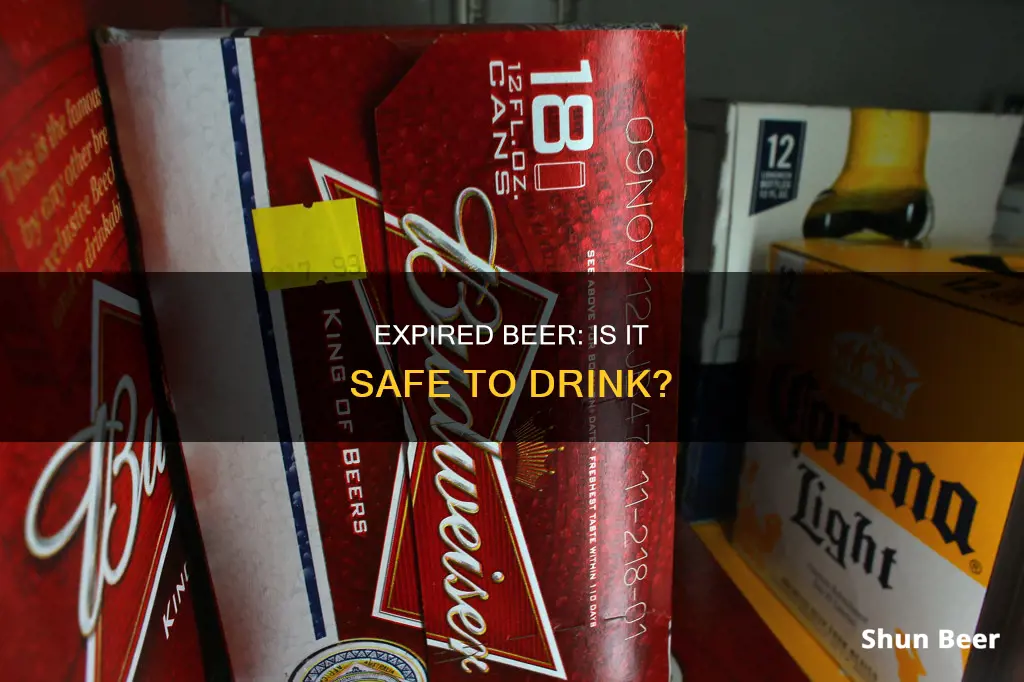
Drinking an expired beer is a risky business, but not for the reason you might think. While it's unlikely to make you sick, an off beer will certainly disappoint your taste buds. The fermentation process, low pH level, and alcohol content of beer make it an unfriendly environment for microorganisms, so even if a beer sits on the shelf for years, it's unlikely to make you ill. However, the taste of beer changes over time, and not in a good way. The longer it's stored, the more the oxygen in the can or bottle reacts with the compounds from malt, yeast, and hops, causing a disappointing papery or cardboard-like taste. Heat and light also negatively impact the flavour of beer, with UV light from the sun causing a chemical reaction that produces a distinct skunky flavour. So, while drinking an expired beer is generally safe, it's probably not going to taste great.
| Characteristics | Values |
|---|---|
| Is drinking expired beer safe? | Yes, drinking expired beer is safe. Beer has a "best before" date, not an expiration date. |
| Why doesn't it make you sick? | Beer's fermentation process, low pH level, and alcohol content make it an unfriendly environment for microorganisms. |
| What causes the change in taste? | Oxidation, which leads to a papery or cardboard-like taste. |
| What are the factors that cause beer to spoil? | Light, oxygen, heat, and time. |
| What kind of beers are more prone to spoilage? | Hoppy beers, pilsners, lagers, wheat beers, and IPAs. |
| What are the signs of spoilage? | Loss of fizz, vinegary taste, and a skunky smell. |
| How to prevent spoilage? | Store in a cool, dark place, preferably a refrigerator. Keep it upright to minimize oxygen exposure. |
What You'll Learn

Is drinking expired beer unsafe?
It's happened to the best of us: you find a long-forgotten can of beer at the back of the fridge or a six-pack of lager that's been neglected in the pantry. But before you pour it down the drain, you might be wondering: is it safe to drink expired beer?
The short answer is yes, drinking expired beer is generally safe. Beer has a "best before" date rather than an expiration or use-by date. This means that while the beer may not taste as good as it once did, it is unlikely to make you sick. The fermentation process, low pH level, and alcohol content of beer make it difficult for harmful microorganisms to survive.
However, there are a few rare situations where you should avoid drinking old beer. If the beer has lost its carbonation, it's likely that the seal was broken and the flavour will be affected. Additionally, if a beer develops a vinegary taste, it's a sign that bacteria have gotten in and it should be discarded.
While drinking expired beer is usually safe, the taste of the beer will change over time. Hoppy beers, like IPAs, are especially sensitive to the effects of oxidation and will lose their characteristic aromas and flavours within a few months. On the other hand, maltier beers with higher ABVs, such as barley wines and imperial stouts, can actually improve with age, developing new flavours that some drinkers prefer.
To keep your beer as fresh as possible, it's best to store it in a cool, dark place like a refrigerator or basement. Beer is sensitive to oxygen, heat, and light, which can cause off-flavours to develop. By minimising exposure to these elements, you can help ensure that your beer stays drinkable and tasty for longer.
Beer Drinking on New Jersey Transit: What's Allowed?
You may want to see also

What causes beer to expire?
Beer doesn't go off in the same way that food does, but it can lose its flavour and freshness over time. There are a few factors that can cause beer to expire.
Oxygen
Oxygen is one of the main culprits when it comes to beer expiration. When beer comes into contact with oxygen during the brewing process, packaging, or storage, it oxidises. This means that the oxygen reacts with the beer's chemical makeup, breaking down hop oils and other flavour compounds. This results in a cardboard-like or stale taste, a reduced aroma, and discolouration.
UV Light
Beer, especially those in clear or green bottles, can become "skunky" when exposed to UV light. This is due to a photochemical reaction between the UV light and the hop compounds in the beer. This results in a distinctive sulfur-like smell and a corresponding off-flavour.
Microbial Contamination
Commercial beers are well-pasteurised and filtered, but improper brewing practices, packaging errors, or poor storage conditions can lead to bacterial contamination. Unintended wild yeast infestations can also contaminate beer, especially in home brews or improperly sealed commercial brews. This can result in a sour, musty, or metallic taste, and the beer may become cloudy or develop unexpected sediment.
Temperature Fluctuations
High temperatures accelerate chemical reactions that break down flavour compounds, while freezing can cause the beer to expand and introduce oxygen upon thawing. This can lead to stale or cooked flavours, off-flavours, and flat or overly fizzy beer.
Aging
Over time, aging can cause the aromas and hop flavours to mellow, and the malt flavour to become stronger. This may be desirable for some, but for others, it can mean a loss of the beer's intended profile.
Other Contaminants
Beer should be stored away from strong odours, as it can be susceptible to flavour contamination.
Beer and Penicillin: Safe Mix?
You may want to see also

How to identify expired beer?
Beer can be safely consumed past its expiration date, but it's important to identify expired beer to avoid unpleasant tastes and aromas. Here are some ways to identify if your beer has expired:
Check the Packaging
Look for a "Best Before" or expiration date on the label. While not mandatory, some brewers include this information or hints such as the date it was brewed. If the beer is past its expiration date, it doesn't necessarily mean it's unsafe to drink, but the taste and quality may deteriorate over time.
Inspect the Bottle or Can
Check the packaging for any signs of damage or improper sealing. Look for dust on the label, which could indicate that the beer has been sitting on the shelf for a while. Inspect for any signs of leakage around the sealed mouth of the bottle, which may suggest exposure to high temperatures.
Examine the Beer
Pour the beer into a clear glass and observe its appearance. Has the beer lost its carbonation, resulting in little to no head or fizziness? Does it have an unexpected haze or excessive sediment? Has the colour significantly darkened or changed? These could be signs of expired or spoiled beer.
Smell the Beer
Use your sense of smell to detect any off-aromas. A skunky or sulfuric smell indicates that the beer has been exposed to UV light. A stale or cardboard-like aroma suggests oxidation. Other unpleasant odours, such as rotten eggs, band-aid, or dampness, could be signs of spoilage or contamination.
Taste the Beer
Take a small sip to determine the flavour and overall quality. Does it taste flat, overly sweet, sour, vinegary, metallic, musty, or mouldy? These are indicators of expired or contaminated beer.
Storage Conditions
Consider the storage conditions of the beer. Has it been stored in a cool, dark place, away from temperature fluctuations and direct sunlight? Has it been stored upright to minimize oxidation? Proper storage is crucial for maintaining the optimal flavour and quality of beer.
Type of Beer
The type of beer also affects its shelf life. Generally, stronger beers with higher alcohol content, such as stouts and barley wines, tend to have a longer shelf life and can even improve with age. On the other hand, hoppy beers like IPAs are best consumed fresh to enjoy their full flavour and aroma.
Non-Alcoholic Beer: Safe Drinking on Probation?
You may want to see also

What happens to expired beer?
Beer doesn't expire in the same way that other foods and drinks do. It doesn't pose the same risk of pathogenic bacterial growth that can cause humans to get sick. This is due to the alcohol content in beer and the presence of hops, which have antimicrobial characteristics. Therefore, it is safe to drink expired beer. However, the taste of expired beer will differ from that of fresh beer.
When beer expires, you may notice some changes in its appearance, taste, and texture. One of the most common signs of expired beer is a loss of carbonation, resulting in a flat beer. Additionally, the oxygen in the beer can create off-flavours, such as a wet cardboard taste. The hop character you love in styles like IPA may also weaken over time.
The rate at which beer expires depends on several factors, including the type of beer, how it is stored, and the environment it is exposed to. Different styles of beer have different shelf lives. For example, IPAs are best enjoyed as fresh as possible, as the volatile aromas from hops tend to dissipate quickly. On the other hand, bottle-conditioned beers with a high ABV content can generally be aged for over a year.
Storing beer in a cool, dark place, such as a refrigerator or a basement, can help slow down the expiration process. Heat and light are two of the main factors that contribute to beer spoilage, so it is important to minimise the beer's exposure to these elements. Additionally, keeping the beer sealed until consumption can also help preserve its freshness.
While drinking expired beer is generally safe, there are a few situations where it is best to discard the beer. If the beer has lost all its carbonation, it is an indication that the seal was broken, and the flavour will be significantly altered. Additionally, if the beer develops a vinegary taste, it is a sign that bacteria have contaminated it, and it should be discarded.
Chugging 24 Beers Daily: A Deadly Affair
You may want to see also

How to store beer to prevent it from expiring?
Beer is best stored in a cool, dark place, such as a refrigerator, basement, or cellar. The optimal temperature range for storing beer is between 45 and 55 degrees Fahrenheit (7-13°C). Beer should be stored upright to minimise air contact and slow oxidation.
Beer should be shielded from direct sunlight and heat sources, as UV rays can cause a chemical reaction in the beer, breaking down its flavour components and causing it to smell and taste like skunk spray. This is why beer is often packaged in dark bottles, which help to block out UV rays. However, cans are more effective than bottles at blocking out UV rays and preventing oxidation.
Kegs should be stored in a cool, dry space, away from other foods, and not be moved around too much.
Once a beer has been opened, it should ideally be resealed and consumed as soon as possible. Opened beer can be preserved using an airtight cap or stopper, but this will only be effective for a short period.
Beer Bar Memberships: Are They Worth the Cost?
You may want to see also
Frequently asked questions
Yes, drinking expired beer is generally safe. Beer has a "best before" date, which is an indication of when it should be consumed to enjoy it fresh. However, it does not pose any health risk if consumed past this date.
Light, oxygen, heat, and time are the main factors contributing to beer spoilage. Hops, which are sensitive to UV radiation, can undergo a chemical reaction, resulting in a skunky flavour. Oxidation can also cause a cardboard-like aftertaste.
Check for any changes in flavour. Expired beer may taste like wet cardboard or have an overly sweet or vinegary taste. Additionally, a loss of fizz indicates that the seal was broken, and the beer should be discarded.
Keep your beer in a cool, dark place, preferably a refrigerator. If stored at room temperature, ensure it is away from direct sunlight. Store bottles and cans upright to minimise oxygen exposure.







